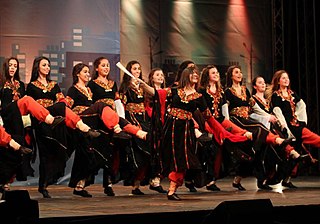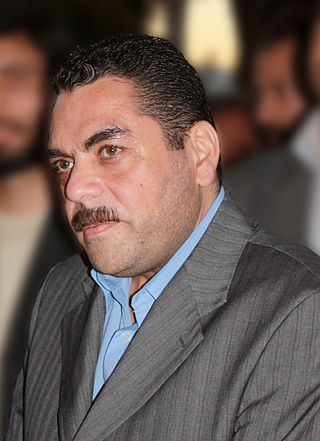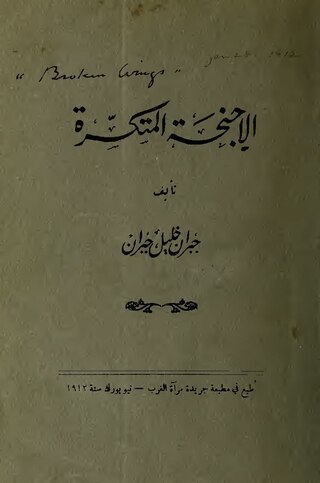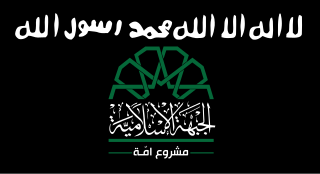
A taboo, also spelled tabu, is a social group's ban, prohibition, or avoidance of something based on the group's sense that it is excessively repulsive, offensive, sacred, or allowed only for certain people. Such prohibitions are present in virtually all societies. Taboos may be prohibited explicitly, for example within a legal system or religion, or implicitly, for example by social norms or conventions followed by a particular culture or organization.

MBC Group, is a Saudi media conglomerate based in the Middle East and North Africa region. Launched in London in 1991, the company moved to its headquarters to Dubai in 2002 then moved to Riyadh in 2022.

Dabke is a Levantine Arab folk dance, popular in Lebanon, Palestine, Syria, Jordan and Iraq. Dabke combines circle dance and line dancing and is widely performed at weddings and other joyous occasions. The line forms from right to left and the leader of the dabke heads the line, alternating between facing the audience and the other dancers. In English, it can be transcribed as dabka, dabki, dabkeh.
Pork is a food taboo among Jews, Muslims, and some Christian denominations. Swine were prohibited in ancient Syria and Phoenicia, and the pig and its flesh represented a taboo observed, Strabo noted, at Comana in Pontus. A lost poem of Hermesianax, reported centuries later by the traveller Pausanias, reported an etiological myth of Attis destroyed by a supernatural boar to account for the fact that "in consequence of these events the Galatians who inhabit Pessinous do not touch pork". In Abrahamic religions, eating pig flesh is clearly forbidden by Jewish (kashrut), Islamic (halal) and Adventist dietary laws.
The X Factor Arabia, originally aired on March 26, 2006 with the title XSeer Al Najah is the Arab version of The X Factor. The Arabic-language version of the program also created by Simon Cowell has a similar format to the British version, in that there are judges who each have a team of contestants to mentor and compete with each other for the X Factor title. The 14-episode first series was broadcast in 22 Arabic-speaking countries. In its debut, it was known as being one of the most watched programs on television and was produced and supported by Rotana, one of the largest production companies in the Arab World. The winner of XSeer Al Najah earned a chance to sign with Rotana. However, with the continuing success of the rival pan-Arab series Star Academy on Lebanese Broadcasting Corporation (LBC), XSeer All Najah lost most of its pan-Arab appeal and was discontinued after season 2.
Bab Al-Hara is one of the most popular television series in the Arab world, reportedly watched by millions of people in the Arab world. The series chronicles the daily happenings and family dramas in a neighborhood in Damascus, Syria in the inter-war period under French rule when the local population yearned for independence. The appeal is cross-generational, and viewers include Muslims, Christians, Druze and Jews from Arab countries, the show was a huge success in the Arab World so MBC managed to renew it for a second season. The series' second season was even a bigger success, and the finale was watched by over a 50 million viewers around the Arab World. It was renewed for 10 more seasons.

Samir Kuntar was a Lebanese Druze member of the Palestine Liberation Front and Hezbollah. He was convicted of terrorism and murder by an Israeli court. After his release from prison as part of the 2008 Israel–Hezbollah prisoner exchange, he received Syria's highest medal, was honored by Iranian President Mahmoud Ahmadinejad, and was designated a Specially Designated Global Terrorist by the US government.

Colette Khoury is a Syrian novelist and poet, born in 1931, who is also the granddaughter of former Syrian Prime Minister Faris al-Khoury. Khoury graduated from Damascus University with a bachelor's degree in French literature and she received a diploma from the school of literature in Beirut. Khoury's notability stirs from her work in politics and literature. Her work as a writer focuses on love and erotica, a subject that was previously taboo in Syrian culture.

Broken Wings is a poetic novel or novella written in Arabic by Kahlil Gibran and first published in 1912 by the printing house of the periodical Meraat-ul-Gharb in New York. It is a tale of tragic love, set at the turn of the 20th century in Beirut. A young woman, Selma Karamy, is betrothed to a prominent religious man's nephew. The protagonist falls in love with this woman. They begin to meet in secret, however they are discovered, and Selma is forbidden to leave her house, breaking their hopes and hearts.
Sex surrogates, sometimes referred to as surrogate partners, are practitioners trained in addressing issues of intimacy and sexuality. A surrogate partner works in collaboration with a sex therapist to meet the goals of their client. This triadic model is used to dually support the client: the client engages in experiential exercises and builds a relationship with their surrogate partner while processing and integrating their experiences with their therapist or clinician.

Razan Zaitouneh is a Syrian human rights lawyer and civil society activist. Actively involved in the Syrian uprising, she went into hiding after being accused by the government of being a foreign agent and her husband was arrested. Zaitouneh has documented human rights in Syria for the Local Coordination Committees of Syria. Zaitouneh was kidnapped on 9 December 2013, most likely by Jaysh al-Islam. Her fate remains unknown. It is suspected that she has been killed.
Cheers to You, Nation pronounced "Kasak Ya Watan" is a Syrian, sociopolitical tragicomic play performed in 1978. Starring the famous Arab actor Duraid Lahham, it is considered one of the most famous Arabic-language plays, and been played and broadcast in different Arabic states. The play was written by Muhammad al-Maghut and directed by Khaldoun al-Malehh.

The Islamic Front was a Sunni Islamist rebel group involved in the Syrian Civil War, which was formed by the union of seven separate groups on 22 November 2013. Its three largest components were Ahrar ash-Sham, the al-Tawhid Brigade and Jaysh al-Islam. The alliance was achieved by expanding the preceding Syrian Islamic Front alliance. It was described as "an umbrella organization rather than a full union", with constituent factions continuing to serve under their own distinct leaderships.

Kara Para Aşk is a Turkish television series broadcast on ATV screens on Wednesday evenings. The leading cast are Tuba Büyüküstün, Engin Akyürek and Erkan Can. The production of the series is undertaken by Ay Yapım, produced by Kerem Çatay, and directed by Ahmet Katıksız. The show is divided into 54 long Turkish episodes and 164 short international episodes. The first episode of the series aired on Wednesday, 12 March 2014, and concluded on Wednesday, 15 July 2015. With gaining significant viewer ratings, it was one of the most popular and most watched television dramas by that time.

Kosai Khauli is a Syrian actor. He portrayed the king of Egypt Ismai’il Pasha in the 2014 historic TV drama Saraya Abdeen that was aired on MBC in 2014.

Ahmad Danny Ramadan is a Syrian–Canadian novelist, public speaker, and LGBTQ-refugee activist who was born in Damascus, Syria. Ramadan's work focuses on themes of immigration, identity, diaspora and belonging. His debut novel, The Clothesline Swing, won multiple awards. The Foghorn Echoes won the 2023 Lambda Literary Award for Gay Fiction.

Hayvi Bouzo is a Syrian-born American broadcast journalist, columnist and television presenter of Kurdish descent. She is a co-founder of Yalla Productions and host of ‘Yalla’ show. Her writing and commentary have been featured in newspapers and outlets including The Jerusalem Post, and Khaleej Times.
Saraya Abdeen is an Egyptian historical TV drama series, The first season was aired on MBC on 29 June 2014, written by Kuwaiti author Heba Meshari Hamada, directed by Amr Arafa, produced by Mahmood Shokri, and starring Qusai Khouli, Yousra, Nour, May Kassab, Ghada Adel and Nelly Karim. The series focuses on life of Isma'il Pasha who was the Khedive of Egypt and Sudan from 1863 to 1879, with his wives and concubines and their Intrigues on each other with their servants and slaves. A second season was released in April 2014 which was directed by Shadi Abu Al-Oyoun Al-Soud.
Simon Asmar was a Lebanese television director and producer, and the creator of Studio al-Fan, the famous and one of the Arab world's first star-maker talent show in Lebanon, that is behind most famous Lebanese stars like Majida El Roumi, Ragheb Alama, Nawal El Zoghbi, Wael Kfoury and Assi El Hellani. Thus he was nicknamed the "Star-maker". Asmar also produced several popular game shows, including Bab al-Haz, Laylet Haz and Ahla bi Hal Tali. He was also founded the River Arts, a theatre-style river-side restaurant and cafe with a large gathering his famous artists with their orchestras, and a destination for Arab and international tourists.
Salma al-Haffar Kuzbari was a Syrian writer and translator. She is best known for her literary criticism and biography on the women's rights activist and writer May Ziadeh, as well as for her writing on Spain's Andalusia region, notably the book The Two Eyes of Seville.











